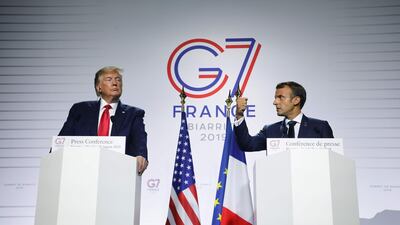The freshly concluded Group of Seven summit in Biarritz and the fires raging through the Amazon rainforest have sent a similar message. More global co-operation is needed, not less and it doesn't matter if not everyone is on the same page. The new multilateralism has a shifting line-up and a changing cast of leaders. Sometimes, it is regionally led and narrowly focused. No one necessarily expects an America under president Donald Trump to be the de facto guide of global progress, as in decades past.
On the southwest coast of France, that new multilateralism was very evident. As host of this year's summit of seven major democracies, French President Emmanuel Macron got to pick non-G7 invitees and set part of the agenda. He focused on the issue of reducing inequality and invited the leaders of Australia, Burkina Faso, Chile, Egypt, India, Senegal, Rwanda and South Africa. On Sunday, Burkina Faso's president, Roch Marc Christian Kabore, asked the G7 for more international help to deal with the regional instability seeping out of Libya. And Mr Macron said G7 leaders had agreed that the fires tearing through the Amazon rainforest were an international emergency. He added that work was under way on "an international mobilisation mechanism" to efficiently help Brazil and other countries in the region with "technical and financial means" to fight the effects of environmental degradation and climate change.
This makes sense. In real and practical terms, more global co-operation would mean countries banding together to work with Brazil to put out the Amazon fires and prevent others, even as Brazil is enabled to pursue its own agenda of sustainable economic growth and development policies. In a sense, if the world regards the Amazon fires as an “international crisis”, to use Mr Macron’s words, it needs to mount an international response. And that has to go beyond caterwauling, criticism or, in the case of the current US administration, indifference. That Brazil's president Jair Bolsonaro subsequently rejected the G7's offer of $22million in aid does not mean multilateral assistance has no purpose.
If anything, Biarritz simply confirmed a process of change under way since Mr Trump’s election. Mr Trump’s presidency upended the assumption that G7 member countries – all highly developed and rich democracies – can always be expected to have broadly compatible views. And the US president, as analysts have bewailed for the past two-and-a-half years, also actively encouraged scepticism about American leadership and the idea of the US as an arbiter for international norms. This has meant a profound change in the expectation and reality of multilateralism. In the past few years, countries have been more readily taking the lead on issues in which they have a stake, some expertise or influence.
Two examples come to mind, although only one ended well. That was Ethiopia’s role in mediating Sudan’s transition from Omar Al Bashir’s regime to civilian rule. Ethiopian prime minister Abiy Ahmed has rightly been praised for his wise and considered engagement through the months-long crisis. The African Union also played its part, underlining the likelihood that peacemaking will increasingly fall to regional groupings and regional power centres rather than the old order, comprising western countries and the international bodies over which they have sway. At the August 18 signing in Khartoum of a transition deal between Sudan’s military junta and civilian leaders, the leaders in attendance were African.
Then there was China's attempt to help Bangladesh and Myanmar resolve the Rohingya crisis. Nearly two years ago, the Chinese foreign minister arrived in Myanmar's capital Naypyidaw after a stopover in Bangladesh and laid out a three-point plan to resolve the Rohingya issue. It was the first time Beijing had offered to mediate in the crisis and it marked China's desire to be a responsible power by means of a proactive multilateralism that embraced two countries in its region. But despite China's mediation attempts, there was little movement from actors on the ground. Rohingya people remain in limbo, fearful to return to the country where their rights are neither recognised nor respected, and Myanmar has yet to take responsibility for protecting their rights and bringing the perpetrators of their misery to justice.
Regional partnerships are blooming on the African continent with last month’s summit to launch the pan-African free trade agreement, an ambitious plan that has taken four years to negotiate. Other than Eritrea, all 55 African Union member countries have signed on. Just days after the launch of the deal, Niger and Burkina Faso signed a separate accord for interstate co-operation on counterterrorism, economic development and natural resource management. In the new multilateralism, new partnerships continue to be forged.


